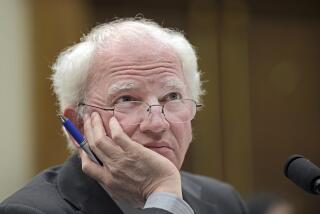Ex-Official Tells of Pushing for Wedtech
- Share via
WASHINGTON — An aide to then-presidential counselor Edwin Meese III warned Army and Small Business Administration officials in 1982 that he would “not stand for any foot-dragging” on an Army contract being lobbied by former White House aide Lyn Nofziger, the aide testified Wednesday.
James E. Jenkins, on the witness stand at Nofziger’s trial on illegal-lobbying charges, said that his warning became even more pungent toward the end of a May 19 White House meeting with the officials about the contract.
“I summed it up by saying I was not going to stand for any bull----!” the heavy-set Jenkins boomed out in the federal courtroom.
Session a Turning Point
The meeting convened by Jenkins apparently was a turning point in the eventual award of a $32-million no-bid engine contract to Nofziger’s lobbying client, Welbilt Electronic Die Corp., later renamed Wedtech Corp.
On April 8, Nofziger--a friend of Meese--had written the presidential counselor that it would be “a blunder” not to give the award to the Bronx, N. Y., firm, and he suggested that Meese or even President Reagan step in to help break a stalemate caused by Army contentions that Welbilt’s proposed costs were too high.
Nofziger, who had resigned not long before as Reagan’s political director, is charged with violating a federal ethics law that restricts lobbying by former high government officials at their former agencies. His lobbying partner, Mark A. Bragg, is charged with aiding and abetting the violation on the Welbilt contract.
Meese Interest Indicated
Jenkins, who was Meese’s top deputy in 1982 before Meese became attorney general, testified Wednesday about other documents indicating that Meese had taken an active interest in the Welbilt matter after the contact from Nofziger.
But, under questioning by defense lawyers, Jenkins testified also that Meese never assigned him to the case and that he, Jenkins, had developed “a personal interest” in helping the minority-owned firm. He said he had long believed that government bureaucrats treated minority businesses unfairly, so “here was an opportunity to do it right.”
Welbilt/Wedtech has been at the center of a massive influence-buying scandal that has resulted in guilty pleas by a number of the now-bankrupt company’s former executives. A former lawyer for Meese and Meese’s former investment adviser have been indicted on racketeering and other charges. Independent counsel James C. McKay said last month that there was “insufficient evidence” to prosecute Meese “as of this date.” Meese is expected to testify at the Nofziger trial.
Jenkins left his White House post to become a Washington marketing representative for Wedtech, then retired to Carmichael, Calif., a year ago.
Under questioning by Nofziger attorney Robert Plotkin, Jenkins said that he had not been advised that he was the target of an investigation.
In detailing Meese’s interest in the Welbilt matter, Jenkins discussed an April 16, 1982, memo he had written to Craig Fuller, then-secretary of the President’s Cabinet.
‘Bronx Needs the Jobs’
“Lyn Nofsiger (sic) has asked Ed Meese to urge the Army to award this contract to Welbilt instead of to Chrysler,” which had also sought the job. “The Bronx needs the jobs,” Jenkins wrote.
A week later, Jenkins began a letter to James C. Sanders, head of the Small Business Administration: “Ed Meese has asked me to look into the Welbilt problem . . . which has been too long on the back burner.” The SBA eventually provided $5 million in grants and loans to help Welbilt obtain the contract.
When questioned by defense lawyers, Jenkins acknowledged that--rather than Meese’s having asked him to look into Welbilt--he had told Meese that he had met with Bragg and would like to help on the contract. Jenkins said that Meese gave the go-ahead after determining that it would not interfere with other business.
More to Read
Inside the business of entertainment
The Wide Shot brings you news, analysis and insights on everything from streaming wars to production — and what it all means for the future.
You may occasionally receive promotional content from the Los Angeles Times.










